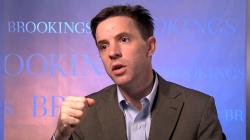

5:00 pm EST - 6:30 pm EST
Past Event
5:00 pm - 6:30 pm EST
1775 Massachusetts Ave., NW
Washington, DC
While Europe has traditionally played a role in solving world problems, in 2011 it became a problem itself. European leaders failed to reassure others about the fate of their currency or the future of the European project, and the continent’s influence on the international scene suffered as a result. Europeans did have some success on Russia, climate change and Libya, but they struggled to wield power in a united and effective way on many other issues. These are some of the findings from the European Foreign Policy Scorecard 2012, an annual assessment of European performance conducted by Brookings Senior Fellow Justin Vaïsse, Hans Kundnani, and a team of more than 35 researchers from the European Council on Foreign Relations. Described by Foreign Affairs as “a pioneering experiment in foreign policy analysis,” the scorecard systematically assesses the European Union’s performance in its relations with China, Russia, the United States, wider Europe, the Arab world and multilateral institutions.
On February 22, the Center on the United States and Europe at Brookings (CUSE) and the Heinrich Boell Foundation will present the results of the latest scorecard and discuss the impact of the financial crisis on Europe’s place in the world. Panelists will include Italy’s Under Secretary of State for Foreign Affairs Marta Dassù and Charles Kupchan of Georgetown University and the Council on Foreign Relations. Justin Vaïsse will present the scorecard. CUSE Director Fiona Hill will provide introductory remarks and moderate the discussion.
After the program, panelists will take audience questions.


Constanze Stelzenmüller
April 22, 2024

Matias Spektor
April 15, 2024

Michael E. O’Hanlon, Constanze Stelzenmüller, David Wessel, Alejandra Rocha, Sophie Roehse, Mallika Yadwad
April 15, 2024